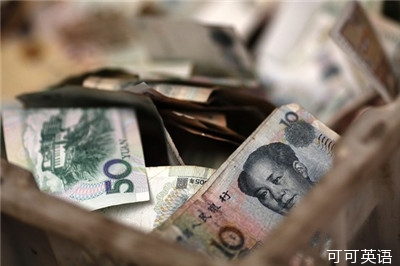
Over the last two weeks, several major investment houses have published reports exploring the idea of a hard economic landing in China. They include 'We don't expect it to happen' caveats.
過去兩周,幾家大型投資機構(gòu)陸續(xù)發(fā)布報告,對中國經(jīng)濟硬著陸的假設(shè)進行了探究。報告附加了“我們并不期望此事發(fā)生”的說明。
But what if it did happen? Would the rest of the world tank as well?
但如果中國經(jīng)濟真的出現(xiàn)硬著陸了呢?全球其他地方是否會隨之一同跌落?
A catalyst for this concern has been the end of America's easy-money policies, which buoyed emerging-market economies. The gradual end of the Fed credit flood has sparked concerns that developing countries with high fiscal and trade deficits, excess credit growth, currency risks and other problems could face a liquidity crisis, leading to a broad loss of confidence.
引發(fā)對中國經(jīng)濟硬著陸擔憂的一個因素是美國退出寬松貨幣政策。該政策對新興市場經(jīng)濟體構(gòu)成支撐,但隨著美國聯(lián)邦儲備委員會(Federal Reserve, 簡稱:美聯(lián)儲)逐步退出寬松貨幣政策,人們開始擔心那些存在高財政赤字、高貿(mào)易逆差、信貸增長過快、貨幣風險等問題的發(fā)展中國家將面臨流動性風險,進而導(dǎo)致市場信心大范圍受挫。
Among the countries investors worry most about are those hit by political uncertainty, such as Venezuela, Argentina and Turkey. Also on the radar are economies with structural concerns including India, Brazil, Indonesia and South Africa.
在這些發(fā)展中國家中,投資者最為擔心的是像委內(nèi)瑞拉、阿根廷、土耳其這類受政治不穩(wěn)定因素干擾的國家,以及像印度、巴西、印尼和南非這樣存在結(jié)構(gòu)性問題的經(jīng)濟體。
China is different, as its leaders are fond of pointing out. It's got huge foreign currency reserves, still-strong economic growth -- GDP slowed slightly to 7.7% on-year in the fourth quarter, from 7.8% in the third -- and it posted 10.6% on-year export growth in January.
正如中國領(lǐng)導(dǎo)人所樂于指出的那樣,中國與上述國家情況不同。中國擁有巨額外匯儲備,經(jīng)濟增長依舊強勁(去年第四季度中國的國內(nèi)生產(chǎn)總值(GDP)同比增長7.7%,較三季度的7.8%略有放緩),且1月份中國出口額同比增長了10.6%。
But that hasn't stopped some investors from seeing the worst, given the Asian giant's extensive links with other emerging markets, credit and debt concerns and the possibility of some internal crisis.
但考慮到中國與其他新興市場有關(guān)廣泛的聯(lián)系,而且該國信貸和債務(wù)情況也令人擔憂,再加上中國存在爆發(fā)內(nèi)部危機的可能性,一些投資者還是難免要預(yù)測一下最糟糕的情況。
'Given that China is the largest emerging economy in the world and has contributed more than 25% to global GDP growth since 2010, a sharp slowdown or deleveraging in China will likely affect everyone and every market,' UBS said in its 'How Might a China Hard Landing Affect the World' report.
瑞士銀行(UBS AG, UBS)在其報告《中國經(jīng)濟硬著陸或?qū)⑷绾斡绊懯澜纭?How Might a China Hard Landing Affect the World)中稱:鑒于中國是全球最大的新興經(jīng)濟體,且自2010年以來對全球GDP增長的貢獻率超過25%,中國經(jīng)濟增速的大幅下滑或大幅去杠桿化將對所有人和所有市場產(chǎn)生影響。
Societe Generale, in its 'What if China Lands Hard' report, predicts that in a worst-case scenario non-performing loan rates could hit 19%, interest-rate spreads could reach 800 basis points, gold prices could rise and then tank, and earnings at manufacturing companies could drop 50%. Keep that hard hat handy, Chicken Little.
法國興業(yè)銀行(Societe Generale)在其報告《若中國經(jīng)濟硬著陸》(What if China Lands Hard)中預(yù)測,最差的情況是不良貸款率飆升至19%、利率差擴大至800個基點、金價先漲后跌、制造企業(yè)的利潤下降50%。若情況真如此駭人,可得做好隨時應(yīng)對的準備。
Drawing on a poll of investors across Asia, Societe Generale outlined several triggers in China it believes could set off a loss of confidence. These include the seizing-up of credit markets, a bank run or a default -- whether the failure of a corporate bond, a 'wealth management product' issued to investors or one of the lightly regulated trust companies that populate China's 'shadow banking' system.
法國興業(yè)銀行根據(jù)對亞洲各地投資者進行的調(diào)查,列出了其認為在中國會引發(fā)市場信心喪失的幾大因素。其中包括信貸市場失靈、銀行遭擠兌或違約。這既包括企業(yè)債券、向投資者發(fā)行的 “財富管理產(chǎn)品”違約,也包括那些大量存在于中國“影子銀行”系統(tǒng)中,且極少受到監(jiān)管的信托公司出現(xiàn)的違約。
Another perceived risk is a policy misstep by regulators trying to tighten liquidity, address hadow banking problems or restrict local-government borrowing, which could set off the very crisis the government is trying to prevent.
還有一個可預(yù)見的風險是,監(jiān)管部門在試圖收緊流動性、解決影子銀行問題或限制地方政府借貸時出現(xiàn)政策失誤,這可能會引發(fā)恰恰是政府力圖避免的危機。
On Wednesday, in its own report on China's slowdown, ING warned investors to be prepared for a crisis or two in emerging markets as countries that banked on breakneck Chinese growth confront a new reality.
荷蘭國際集團(ING)在周三發(fā)布的一份關(guān)于中國經(jīng)濟增速放緩的報告中警告稱,投資者需要對新興市場可能出現(xiàn)的一兩場經(jīng)濟危機作好準備,因為依賴中國經(jīng)濟高速增長的國家都面臨這一個新的現(xiàn)實。
'Some of the erstwhile winners may find adjustment difficult,' ING economist Tim Condon wrote -- though he said Asian economies don't appear particularly vulnerable as U.S. monetary policy remains accommodative.
荷蘭國際集團的經(jīng)濟學(xué)家康登(Tim Condon)稱,部分昔日的贏家可能會發(fā)現(xiàn)難以做出調(diào)整,不過他表示,似乎亞洲經(jīng)濟體并不是特別的脆弱,因為美國貨幣政策保持寬松。
UBS sees three areas where a hard landing in China could affect the rest of the world. The biggest and most obvious is through the nation's trade ties. Not surprisingly, major commodity exporters and China's neighbors are most vulnerable on this count, especially Mongolia, Taiwan, Australia, South Korea, Japan and Southeast Asia.
瑞銀預(yù)計中國經(jīng)濟硬著陸對全球其他地區(qū)的影響將體現(xiàn)在三個領(lǐng)域。影響最大也是最明顯的將是通過該國貿(mào)易紐帶所產(chǎn)生的影響。并不令人驚訝的是,主要大宗商品出口國以及中國周邊國家和地區(qū)最容易在這方面受到?jīng)_擊,尤其是蒙古國、臺灣、澳大利亞、韓國、日本及東南亞地區(qū)。
A Bank of America Merrill Lynch survey of fund managers found the biggest perceived risk to international markets was a hard landing in China that triggers a collapse in commodities prices. The proportion of fund managers fingering China as a risk rose to 46% in February, up from 37% in January and 26% in December.
美銀美林(Bank of America Merrill Lynch)對基金經(jīng)理進行的一項調(diào)查發(fā)現(xiàn),國際市場能預(yù)料到的最大風險是中國經(jīng)濟硬著陸引發(fā)大宗商品價格暴跌。2月份將中國經(jīng)濟前景作為一個風險因素的基金經(jīng)理占比升至46%,高于1月份的37%和去年12月份的26%。
Financial links are a second area of potential vulnerability. These are much less extensive than China's trade links, UBS believes, in large part because Beijing still tightly controls capital flows.
第二個潛在威脅是中國經(jīng)濟硬著陸可能通過金融紐帶影響其他地區(qū)。但瑞銀認為,中國與全球其他地區(qū)的金融聯(lián)系并不像該國的貿(mào)易紐帶那樣廣泛,這主要是因為中國政府仍然嚴格控制資本流動。
According to the Bank for International Settlements, foreign banks are exposed to Chinese entities to the tune of $700 billion in foreign currency, less than 5% of Chinese banks' domestic credit and around 18% of China's official foreign reserves. That said, some economies are more exposed: Hong Kong and Singapore have the most to lose.
根據(jù)國際清算銀行(Bank for International Settlements)的數(shù)據(jù),海外銀行針對中國實體面臨的外匯風險敞口共計7,000億美元,不到中國銀行業(yè)國內(nèi)信貸總量的5%,大約相當于中國官方外匯儲備的18%。不過,部分經(jīng)濟體可能更明顯地暴露在中國經(jīng)濟硬著陸可能帶來的風險中:香港和新加坡?lián)p失可能最為慘重。
The third way that a hard landing in China would affect the world is through market contagion, when a loss of confidence spreads with unforeseen consequences. The Asian financial crisis in 1997, sparked by seemingly inconsequential devaluations in Thailand and the Philippines, drew in economies with supposedly sound fundamentals, including Singapore and Hong Kong.
中國經(jīng)濟硬著陸將對全球產(chǎn)生影響的第三個方式是通過風險蔓延,即信心喪失的現(xiàn)象伴隨著難以預(yù)料的后果蔓延。1997年爆發(fā)的亞洲金融危機就是由泰國和菲律賓表面上看起來無關(guān)緊要的貨幣貶值引發(fā)的,之后波及到新加坡和香港等原本基本面良好的經(jīng)濟體。
If nothing else, the recent concern underscores how important China has become as an economic engine and an emerging market extraordinaire, where even the hint of a problem is enough to jangle global nerves.
近期的市場憂慮至少凸顯了中國作為一個經(jīng)濟引擎和強大的新興市場國家,其地位已經(jīng)變得多么重要,甚至中國經(jīng)濟可能出現(xiàn)問題的細微跡象就足以刺激全球神經(jīng)。
'You often hear people say emerging markets are a worry,' UBS economist Tao Wang said. 'They could be bearish on China and bullish somewhere else. If you're really bearish on China, though, I'm not sure you can be bullish on anywhere else.'
瑞銀經(jīng)濟學(xué)家汪濤說,經(jīng)常可以聽到人們說新興市場令人擔憂,他們可能不看好中國經(jīng)濟前景,但看好其他地區(qū);但如果你真的不看好中國,我不確定你是否真的還能看好其他地區(qū)。


